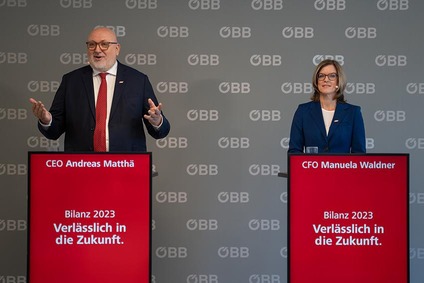
Geopolitical factors, high energy costs and, as a result, an industrial recession in key markets led to a significant drop in demand and a noticeable decline in capacity utilisation for the RCG in 2023. Rail transport was also at a glaring disadvantage compared to road transport, since while the price of electricity more than doubled in 2023 compared to pre-crisis levels in Austria and even tripled internationally in some cases, the price of diesel only rose by just over 20%. This particularly affected single wagonload transport (SWL) and continental intermodal transport, where rail is in direct competition with trucks.
Keeping the industrial powerhouse running
Despite these circumstances, ÖBB’s freight transport division once again posted a positive result in 2023. The RCG managed to close the year with an EBT of €13.0 million. Revenue totalled around €1.91 billion, slightly below the figure for 2022 (€1.94 billion). In 2023, the RCG ensured that almost 420,000 trains, or around 1,150 trains every day, safely reached their destination. Last year, efficient logistics solutions made it possible for the RCG to transport 78.5 million net tonnes and cover more than 26.1 billion net tonne-kilometres with its own locomotives and personnel.
Highlights that shaped 2023
The RCG implemented two of its expansion plans at the beginning of the year. Firstly, the company opened a branch in Shanghai with its own employees on 1 January 2023. Secondly, a new carrier company was also established in Serbia. This means that the RCG was operating its own traction in 13 countries in 2023. The RCG Annual Review contains many other highlights - such as new TransFER connections, multimodal transport for big-name customers and more.
More information
29.04.2023
 Austria
Austria
 Hungary
Hungary
 Bosnia-Herzegovina
Bosnia-Herzegovina
 Bulgaria
Bulgaria
 China
China
 Germany
Germany
 Italy
Italy
 Croatia
Croatia
 The Netherlands
The Netherlands
 Poland
Poland
 Romania
Romania
 Russia
Russia
 Serbia
Serbia
 Slovakia
Slovakia
 Slovenia
Slovenia
 Czech Republic
Czech Republic
 Turkey
Turkey